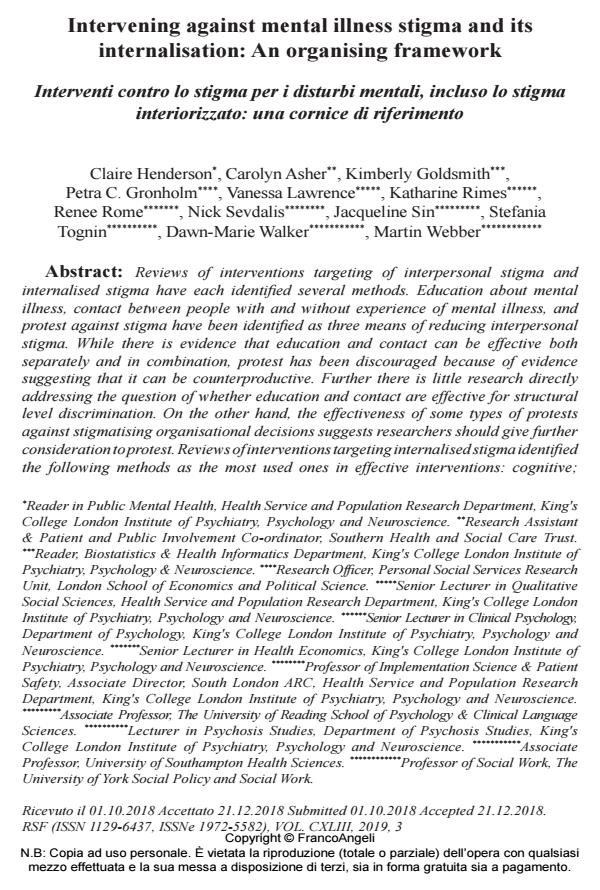Interventi contro lo stigma per i disturbi mentali, incluso lo stigma interiorizzato: una cornice di riferimento
Journal title RIVISTA SPERIMENTALE DI FRENIATRIA
Author/s Claire Henderson, Carolyn Asher, Kimberly Goldsmith, Petra C. Gronholm, Vanessa Lawrence, Katharine Rimes, Renee Rome, Nick Sevdalis, Jacqueline Sin, Stefania Tognin, Dawn-Marie Walker, Martin Webber
Publishing Year 2019 Issue 2019/3
Language English Pages 25 P. 109-131 File size 209 KB
DOI 10.3280/RSF2019-003005
DOI is like a bar code for intellectual property: to have more infomation
click here
Below, you can see the article first page
If you want to buy this article in PDF format, you can do it, following the instructions to buy download credits

FrancoAngeli is member of Publishers International Linking Association, Inc (PILA), a not-for-profit association which run the CrossRef service enabling links to and from online scholarly content.
Reviews of interventions targeting of interpersonal stigma and internalised stigma have each identified several methods. Education about mental illness, contact between people with and without experience of mental illness, and protest against stigma have been identified as three means of reducing interpersonal stigma. While there is evidence that education and contact can be effective both separately and in combination, protest has been discouraged because of evidence suggesting that it can be counterproductive. Further there is little research directly addressing the question of whether education and contact are effective for structural level discrimination. On the other hand, the effectiveness of some types of protests against stigmatising organisational decisions suggests researchers should give further consideration to protest. Reviews of interventions targeting internalised stigma identified the following methods as the most used ones in effective interventions: cognitive; narrative; behavioural decision making, and psychoeducational. Since these reviews, recent work has begun to identify contact as effective for reducing internalised stigma. This article aims to synthesise these fields with the following objectives: (i) to highlight the similarities between interventions targeted to interpersonal and internalised stigma and the implications of these similarities; (ii) to draw attention to the need to evaluate structural level interventions; (iii) to create a comprehensive model for intervening against stigma using the ‘cycle of oppression’ model which is widely applied in diversity and inclusion training. This model is proposed to be useful both to inform decisions about designing and targeting interventions, but can also be used as content for an intervention to reduce internalised stigma and help people with mental illness and their ‘allies’ to intervene against stigma themselves.
Keywords: Stigma, stereotypes, prejudice, discrimination, oppression
Claire Henderson, Carolyn Asher, Kimberly Goldsmith, Petra C. Gronholm, Vanessa Lawrence, Katharine Rimes, Renee Rome, Nick Sevdalis, Jacqueline Sin, Stefania Tognin, Dawn-Marie Walker, Martin Webber, Intervening against mental illness stigma and its internalisation: An organising framework in "RIVISTA SPERIMENTALE DI FRENIATRIA" 3/2019, pp 109-131, DOI: 10.3280/RSF2019-003005